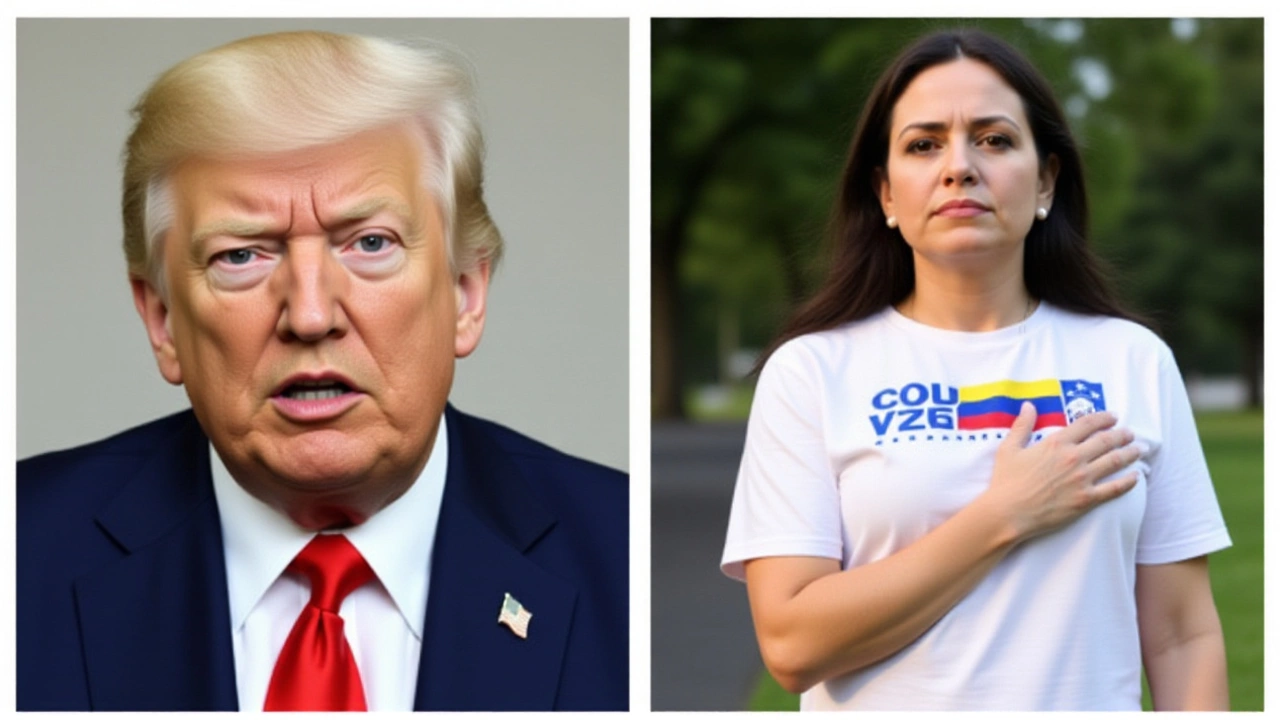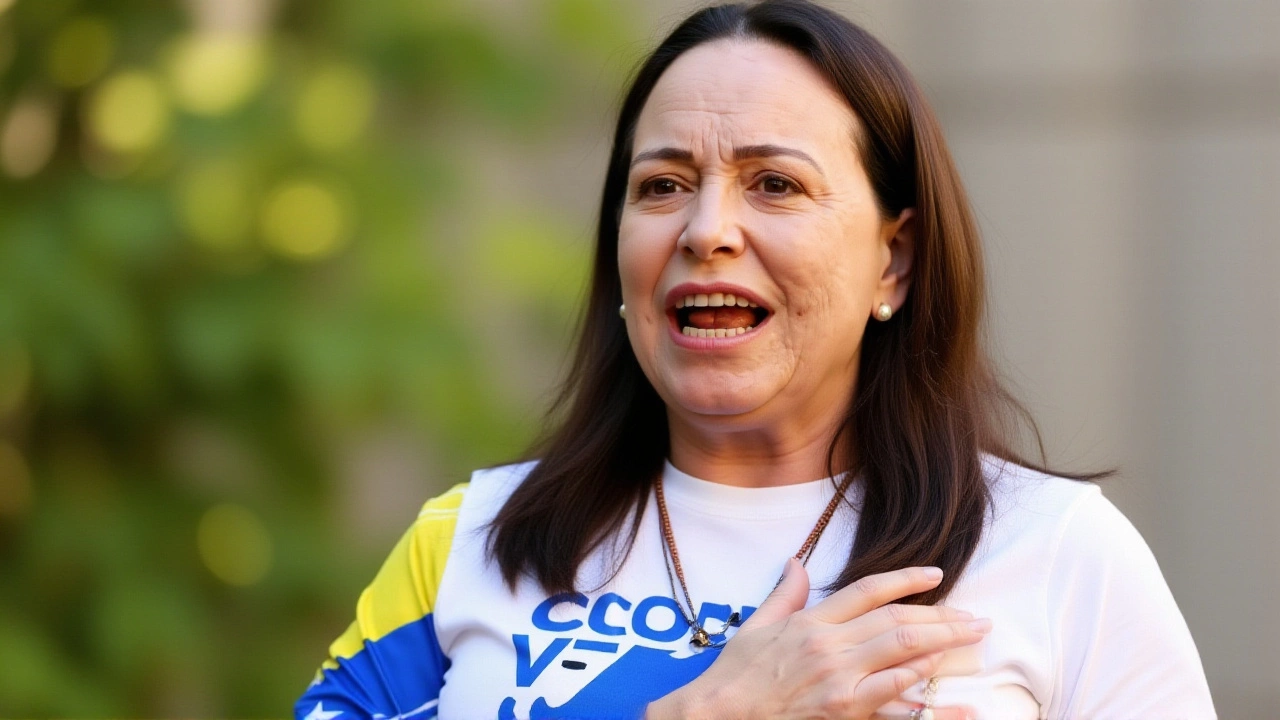When María Corina Machado, a 58‑year‑old industrial engineer turned opposition firebrand, was said to have received the Nobel Peace Prize in a recent Deutsche Welle video, the claim sent shockwaves through Caracas and the diaspora alike. The DW clip, posted on YouTube under the title “Who is Nobel Peace Prize laureate and Venezuelan …”, declares the Nobel Committee recognized Machado for “promoting democratic rights” and for acting as a “unifying figure” in a country where the opposition has long been fragmented. No ceremony date, venue, or official Nobel press release accompanies the assertion, leaving observers to wonder whether it is a factual announcement or a journalistic misstep.
Background and Political Rise
Machado first entered public life in 2002, founding the vote‑monitoring group Sumate to challenge alleged electoral fraud. Her technical background in industrial engineering gave her a methodical approach to organizing protests, a skill that would later define her political style. In 2010 she won a seat in the National Assembly with the highest vote total of any candidate, a testament to her growing popularity. During her term (2010‑2015) she became a vocal critic of President Nicolás Maduro’s administration, denouncing the regime’s erosion of democratic institutions and the deepening humanitarian crisis.
Her parliamentary tenure ended abruptly in March 2014 when, after delivering a speech at the Organization of American States in Washington, D.C., she was expelled by the then‑President of the National Assembly, Diosdado Cabello. Cabello cited “procedural irregularities”, but international observers labeled the move a violation of due process and an effort to silence dissent.
The DW Video and Nobel Peace Prize Allegation
On October 3, 2023, Deutsche Welle uploaded a four‑minute segment featuring reporter Oscar Shanker. Shanker describes Machado as “a real symbol of resistance in Venezuela” and emphasizes her commitment to non‑violent protest. The video’s central claim—that the Nobel Committee has awarded the prize to Machado—appears in the opening narration and is repeated twice, yet no source or official statement is cited.
“She’s not a newcomer to politics,” Shanker says, “although she studied industrial engineering, she decided to take on one of the toughest fights in Latin America, challenging authoritarian power.” The narration adds that Machado was “one of hundreds of candidates nominated for the award,” a phrasing that mirrors the Nobel’s usual shortlist process but lacks the ceremony’s hallmark announcement in December.
Media analysts have pointed out that the Nobel Committee traditionally publishes its laureates on its own platform and that the 2024 laureate list includes a different set of names. The absence of an official press release, combined with the video’s vague reference to an “unspecified current year,” fuels skepticism.
Yale World Fellows Profile vs. Nobel Claim
Contrasting the DW piece, the Yale University World Fellows profile offers a meticulously documented biography. The profile lists Machado as National Coordinator of Vente Venezuela, a liberal party founded in 2013, and a founding member of the 2017 coalition SoyVenezuela alongside Antonio Ledezma and Diego Arria. It notes her role in the OAS speech, her expulsion, and her continued activism despite repeated arrests.
The Yale entry makes no mention of any Nobel award, underscoring the discrepancy between an academic credentialing system and the DW video’s sensational claim. Yale’s rigorous verification process lends credence to the view that the Nobel rumor may be unfounded.
Reactions from Venezuelan Authorities and the International Community
Venezuelan officials have been tight‑lipped. In a brief statement to state media, the Ministry of Foreign Affairs dismissed the alleged Nobel award as “fictional propaganda” aimed at destabilizing the country. Diosdado Cabello, still a powerful figure in the United Socialist Party of Venezuela (PSUV), called the claim “another Western attempt to glorify a traitor.”
Internationally, human‑rights NGOs such as Amnesty International and the International Crisis Group issued statements praising Machado’s long‑standing advocacy but did not comment on the Nobel claim. A spokesperson for the Nobel Committee, when reached for comment, said they were “currently reviewing inquiries regarding recent misinformation about the prize.”

Implications for the Venezuelan Opposition
Whether or not the prize is real, the story has tangible effects. For supporters inside Venezuela, the narrative of an international accolade fuels morale and provides a rallying point in a climate of repression. For the regime, it offers a pretext to intensify surveillance and clamp down on gatherings, fearing the symbolism could translate into real‑world dissent.
Political analysts note that the controversy illustrates the power of media framing. A single video can generate headlines across Latin America, prompting discussions in parliament and on social platforms. The episode also highlights the challenges opposition leaders face in verifying information when state‑controlled outlets dominate the information space.
Future Outlook
Machado is slated to attend the upcoming OAS General Assembly in Washington, D.C., in early 2025, where she is expected to address the humanitarian crisis and call for renewed sanctions against the Maduro regime. Observers will be watching closely to see if the Nobel claim resurfaces or if the Nobel Committee issues an official clarification.
Meanwhile, the opposition’s strategic priority remains building a united front capable of contesting the 2025 presidential election, scheduled for November. The alleged Nobel recognition, real or imagined, could become a diplomatic lever in talks with European states seeking to mediate a political solution.
- Machado founded three political entities: Sumate (2002), Vente Venezuela (2013), and SoyVenezuela (2017).
- She was expelled from the National Assembly in March 2014 by Diosdado Cabello.
- The DW video claims a Nobel Peace Prize award but provides no official source.
- The Nobel Committee has not confirmed any such award for Machado.
- International reactions range from praise of her activism to caution about unverified claims.
Frequently Asked Questions
Has María Corina Machado actually won the Nobel Peace Prize?
No official announcement from the Nobel Committee has been made. The claim originates from a Deutsche Welle video that does not cite a primary source, and the Committee’s own communications have not listed her as a laureate.
What are the main organizations Machado has founded?
Machado founded Sumate in 2002, a citizen‑monitoring group; Vente Venezuela in 2013, a liberal political party; and SoyVenezuela in 2017, a broad opposition coalition that includes figures like Antonio Ledezma and Diego Arria.
How did the Venezuelan government respond to the Nobel claim?
The Ministry of Foreign Affairs dismissed the story as propaganda, and Diosdado Cabello labeled it a “Western attempt to glorify a traitor,” emphasizing the regime’s skepticism toward any narrative that might empower the opposition.
What impact could a Nobel award have on Venezuela’s opposition?
Even an unverified Nobel mention can boost morale among activists, attract international attention, and potentially sway diplomatic discussions. Conversely, it may trigger harsher crackdowns by authorities fearing increased legitimacy for the opposition.
When is Machado expected to speak publicly again?
She is slated to address the OAS General Assembly in Washington, D.C., in early 2025, where she will likely highlight Venezuela’s humanitarian crisis and call for renewed international pressure on the Maduro regime.
